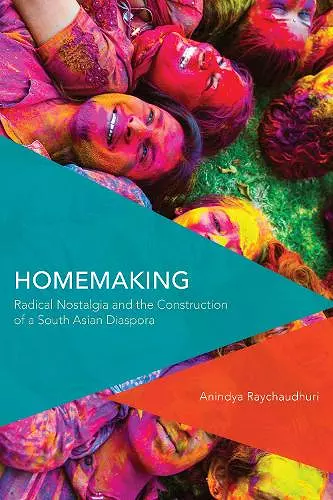Homemaking
Radical Nostalgia and the Construction of a South Asian Diaspora
Format:Hardback
Publisher:Bloomsbury Publishing PLC
Published:19th Oct '18
Currently unavailable, and unfortunately no date known when it will be back
This hardback is available in another edition too:
- Paperback£35.00(9781783482634)

Is it possible to think of a counter-hegemonic, progressive nostalgia that celebrates and helps sustain the marginalised? What might such a nostalgia look like, and what political importance might it have?
Homemaking: Radical Nostalgia and the Construction of a South Asian Diaspora examines diasporic life in south Asian communities in Europe, North America and Australia, to map the ways in which members of these communities use nostalgia to construct distinctive identities.
Using a series of examples from literature, cinema, visual art, music, computer games, mainstream media, physical and virtual spaces and many other cultural objects, this book argues that it is possible, and necessary, to read this nostalgia as helping to create a powerful notion of home that can help to transcend international relations of empire and capital, and create instead a pan-national space of belonging.
This homemaking represents the persistent search for somewhere to belong on one’s own terms. Constructed through word, image and music, preserved through dreams and imagination, the home provides sustenance in the continuing struggle to change the present and the future for the better.
Raychaudhuri’s work on South Asian diasporic nostalgia is an invaluable contribution to memory studies that deals with topics as diverse as Brexit, BBC Asian broadcasting, and diasporic literature. Moving from experiences of the everyday – like food – to historical figures, Raychaudhuri offers a sophisticated portrait of nostalgia’s radical potential to transform and challenge the idea of home. -- Churnjeet Mahn, Strathclyde Chancellor's Fellow, Department of English, the University of Strathclyde
Anindya Raychaudhuri’s theoretic scaffolding of the argument is unique, and promises to open new avenues for reading South Asian diasporic subjects and spaces. The stunning clarity of the argument is highlighted by a contextualized reading of diaspora in a contemporary, heightened, political climate of rising populist nationalism. And, it proves the validity of making such an argument across a range of cultural spaces spanning literature to print, visual, and digital media. Arguing against a well-rehearsed trend in South Asian diaspora studies to signal loss, nostalgia, or anti imperial struggles as inherently conservative, the book proposes a radical idea of progressive presence by re-reading the spatial and experiential vectors of home and not-home. Furthermore, by interrupting the customary practice of locating the analysis outside the “I,” it turns the lens on authorial presence as subjective, and as fully capable of theorizing while experiencing the complexities of being a diasporic herself. This adds an elegant, feminist anthropological element. While focusing mainly on England and Brexit to read diaspora in the 21st century, the book offers literary analyses of diasporic novelists whose characters return fleetingly to homelands while pivoting smoothly to the nativist point of view and the clamoring of nationalists against unwelcome others in the press and on social media. To a lesser degree, the book’s analytical arc also explores Trump’s America and other European nations faced with the reality of global flows of peoples across borders and cultures. The final gesture of nuancing the randomness of immigrant lives located in the crosshairs of ephemeral and agentive, diasporic presence, is, indeed remarkable. -- Gita Rajan, Professor of English, Fairfield University
The idea of nostalgia is interrogated and offered in terms of a critical hermeneutics across actual and imagined places where fiction, cinema, foodscapes, cultural geographies and other popular cultures across Britain and South Asia interact. In doing so, a rich set of examples are offered to illuminate the diasporic condition as transformative, complex and one that we can all learn from. -- Rajinder Dudrah, Professor of Cultural Studies and Creative Industries, Birmingham School of Media, Birmingham City University
ISBN: 9781783482627
Dimensions: 233mm x 161mm x 19mm
Weight: 531g
216 pages